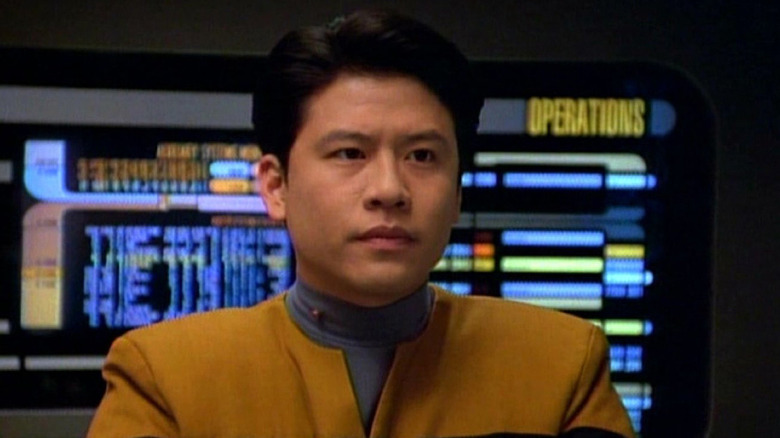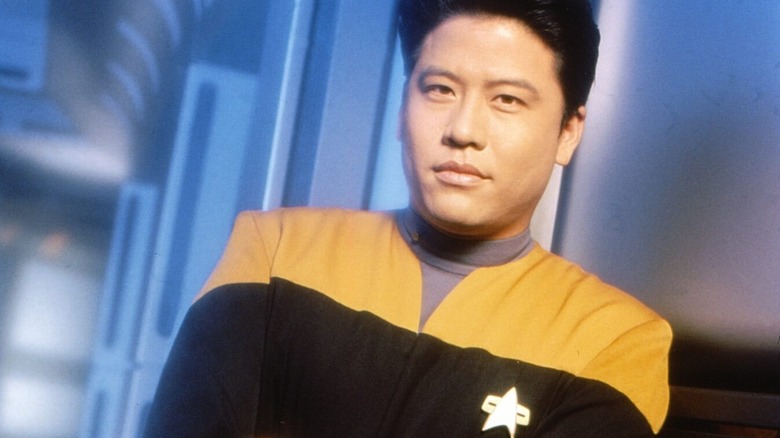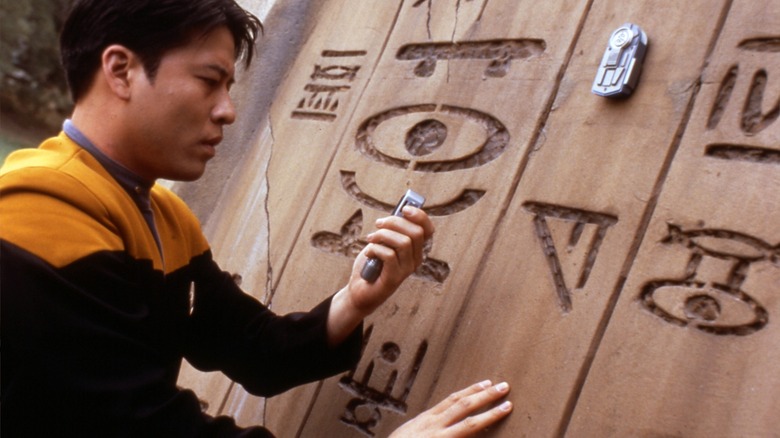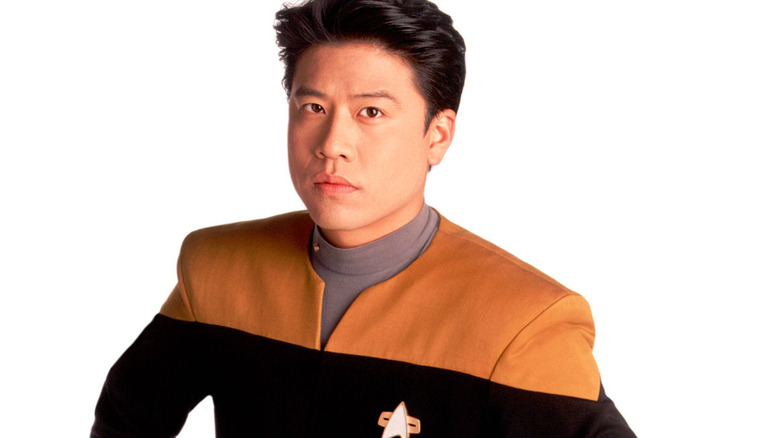Why Garrett Wang Thinks Star Trek: Voyager Wasted Kim's Potential
The first three seasons of "Star Trek: Voyager" were a little rocky. While the series started strong in 1995 — it was the flagship series on The UPN, a brand new network at the time — it struggled to attain the same ratings as "Star Trek: The Next Generation" and its contemporaneous sibling "Star Trek: Deep Space Nine." In the third season, the showrunners added a holodeck beach resort to the show to presumably increase its sex appeal, offering more opportunities for cocktails, flirting, and actors in swimsuits. By the end of the third season, the showrunners still needed something to jazz up "Voyager," and they had already planned to introduce a new character, Seven of Nine (to be played by Jeri Ryan), who was, in the words of executive producer Brannon Braga, "a Borg babe."
In order to accommodate the inclusion of a new character, however, an old character had to go. Scuttlebutt at Paramount — and this is the popular rumor believed by fans — was that the decision was between Ensign Harry Kim (Garrett Wang), the straight-laced, ultra-capable engineer, and Kes (Jennifer Lien) the compassionate doctor's assistant. Eventually, Lien was cut and Wang was retained, giving Harry Kim more opportunities for the character to grow. It can't be a coincidence that Wang was kept on the show right after he was declared one of the 50 Most Beautiful People Alive by People Magazine. It was also eventually revealed that Lien was struggling with some personal issues, in addition to the writers having trouble with her character.
But now Harry Kim faced a conundrum. Kim's most striking feature, at least at the beginning of the series, was that he was young and inexperienced. On a show that was designed to last for at least seven years (and "Voyager" ended up running seven seasons), one can only remain "young" for so long. Eventually the character will have to age and grow. Wang feels, as stated in an interview with TrekMovie.com, that Harry Kim was not permitted to grow as much as he could have. Wang feels, like many of the fans of "Voyager," that it was a grave injustice that a capable officer like Harry Kim remained an ensign throughout his entire tenure on the U.S.S. Voyager.
Harry Kim was pretty basic
Harry Kim had a vague character description at the show's start. Wang said he was a "pretty basic" character, and that there was no real plan as to his character arc:
"Mine was pretty basic. He's fresh out of Starfleet Academy, the young, eager duty-minded ensign. Ensign Kim had the most blank canvas to work with, right? He was so green."
On the occasions when Kim was going to get a character arc, the showrunners were generous in warning him about his workload:
"But did they ever discuss character arcs with me? Very rarely, to be honest. Every now and then I would get a call saying, 'Hey, we're thinking about doing an episode that revolves around your character, and this is what going to happen.' I knew before the hundredth episode, 'Timeless,' that that episode was going to revolve around Kim. That call came from Brannon Braga probably two weeks before we started filming that one. And he said, 'Listen man, this is going to be "Voyager's" signature episode. So just want to make sure you prepare for this, get a lot of sleep, focus well, because you're all over this one.'"
But there was one instance, Wang recalled, wherein a great idea was presented to him, but then rescinded.
"And then there was another time they called up and said, 'Hey, we're going to do an episode next season, it's gonna be our "Quantum Leap" episode... Kim wakes up in the body of a serial killer in modern-day Los Angeles. And he's being chased by the FBI for the entire episode to try to get back to Voyager. I thought, 'Wow, this is like The Fugitive mixed with "Quantum Leap."' I was so excited—and they never filmed it. They ended up not doing it at all and that bummed me out."
Pitching ideas
"Star Trek" has a proud tradition of listening to actors for ideas, and they are one of the few shows that had an open-door policy when it came to scripts: Fans could mail in scripts to "Star Trek" and they would all be given consideration. As such, several character developments on the show would be pitched by the actors themselves. Robert Picardo, who played the holographic Doctor on "Voyager" was notorious for pitching ideas to the show's staff. Wang had a few ideas as well, which would have played into his strengths as an actor:
"I tried, but I wasn't as persistent as Robert Ricardo. Bob Picardo just kept calling them until they finally capitulated. I gave it a shot, 'cause I kept saying, 'Listen guys, my strength is my impersonations, my ability to do accents and presentations. Let us have a B-storyline where the crew has a ship-wide talent show. And Ensign Kim gets up and does his impersonation at The Doctor, of Janeway, of whoever.' And they were like, 'Eh.... no.'"
Indeed, not only was Wang's talent for impersonation not exploited, but he had to stand idly by while watching others being given impersonation assignments:
"And then what was so frustrating was that through the seven years, there's a few times that actors on 'Voyager' got to basically impersonate other characters; specifically, when the doctor is in Seven of Nine's body, you remember that? And Seven of Nine has to basically impersonate The Doctor. And then the other time was when Barclay from TNG was in the mess hall. And he ends up doing his impersonation of Janeway. Now, both of these scenes: Guess who they had in that scene right next to the actor doing their impersonation? Yours truly. So it was almost like they said, 'Not only are we not going to let you have what you ask for, we're gonna rub salt in your wound and make you watch other people do their substandard, not-as-good impersonation of that person,' and it was killing me."
Martial arts and the saxophone vs. the clarinet
Garrett Wang, like many of the actors involved in "Star Trek," watched the series when he was working on it. The franchise has always been keen on establishing canon, and often characters from different shows would interact. Actors would have to prepare for that. Wang wanted to do some martials arts on "Voyager," knowing that Worf (Michael Dorn) had done some on both "Next Generation" and "Deep Space Nine."
"[I once said] 'I know that Worf did judo in TNG. I'd love to introduce some other martial arts where Kim gets to do that, maybe on the holodeck." And I even went and trained — I chose Krav Maga — but they said no to that too. And so the only thing they finally agreed to over the seven years was I said, "The clarinet is not a very manly instrument. Could you please give me a saxophone?" So they removed the clarinet, and the saxophone ended up in my quarters. So there's an episode where do you see a saxophone in there, and that's the only thing that I got pushed through."
A saxophone, which, it turns out, he rarely got to play.
"Every time you see Kim playing an instrument, it's always been the clarinet. And then season seven, they threw me a bone. They're like, 'Well, we turned him down on the whole impersonation talent show thing. We turned it down on the Krav Maga suggestion, let's give the kid the damn saxophone, but we won't show him playing it. We'll just put it in his quarters, just to show that we're still in control.' And that's what happened."
Most "Star Trek" shows are ensemble pieces, and giving every member of the ensemble equal time is a struggle for writers, and frustrating for actors. Wang played Harry Kim capably, but, as he wanted heard, he was capable of so much more.



